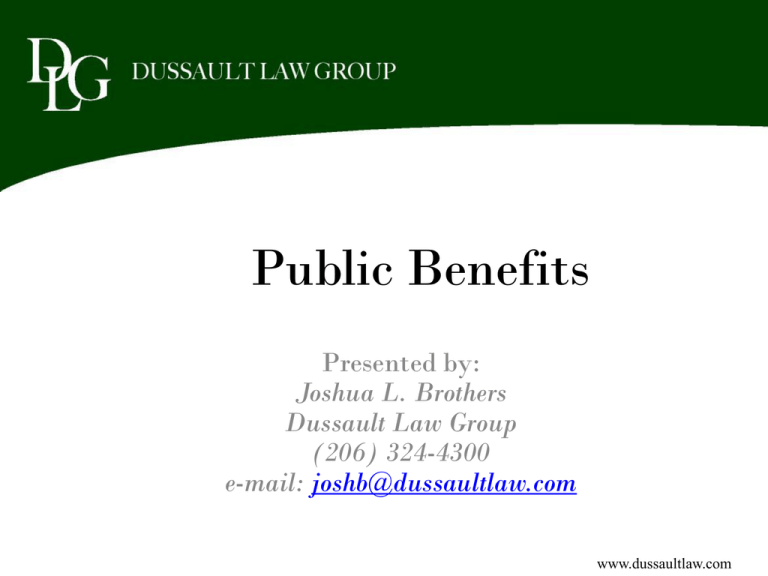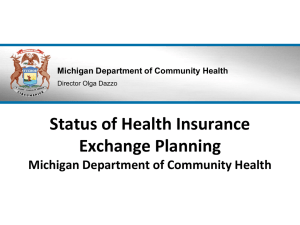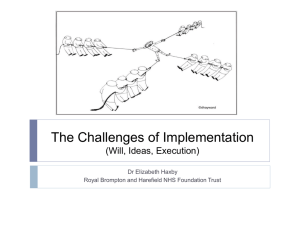Medicaid & Beyond
advertisement

Public Benefits Presented by: Joshua L. Brothers Dussault Law Group (206) 324-4300 e-mail: joshb@dussaultlaw.com www.dussaultlaw.com Public Benefits Overview • Federal – Social Security • SSI - $674/mo max • SSDI - varies – Medicare • • • • Hospital Doctor Visits Prescription Drugs Limited Rehab • State – Medicaid • DSHS • Medical Assistance • Long Term Care – DDD • • • • • Extended dental Family Support Waivers Residential Work & Education – DVR – Food Stamps – Welfare www.dussaultlaw.com Eligibility for Social Security and Medicaid/Medicare • SSI/Medicaid – Disabled, blind, >65 • SGA - $1,000/month – “Means tested” • Income ($20 exemption) – Earned - $2:$1 ($65 exemption) – Unearned - $1:$1 – ISM – 1/3rd reduction • Resources (< $2000) • Exempt Assets – – – – – – Residence (<$500k) Vehicle (any value) Personal effects SNT Burial, funeral, term insurance • “SSA”/Medicare – Disabled, blind, >65 • SGA - $1,000/month – “Entitlement program” • Individuals who have paid FICA taxes in the last 20 of 40 quarters prior to disability – Survivor, Retirement, and Disability – Medicare available when: over 65 or meets SSA disability definition, 29 months post injury www.dussaultlaw.com Supplemental Security Income (SSI) • Provides Cash benefit of up to $674 to be utilized for food and shelter expenses (as of 1/09). • Some States provide cash supplements to base SSI limit • “Gatekeeper” to Medicaid and other public benefit programs www.dussaultlaw.com SSI Income • Earned Income: – Sources: wages, self employment, royalties and any other income received from employment activities – $20 general exclusion – $65 earned income exclusion – $2:$1 reduction in SSI benefits • Unearned Income – Sources: Payments from annuities or trusts, alimony/support payments, dividends, interest, gifts, other SSA benefits, etc. – $20 general exclusion – $1:$1 reduction in SSI benefits www.dussaultlaw.com SSI Income (ISM) • In-Kind Support & Maintenance • Any item an individual receives in cash or in-kind that can be used to meet his or her need for food or shelter. • Reduction to SSI benefits lesser of: – 1/3rd reduction (presumed maximum value –PMV) – $1:$1 reduction www.dussaultlaw.com SSI Calculation Example • Individual earns $275 in wages in a month • Receive $300 Gift from family Maximum SSI Amount $674 Earned Wages $275 Less $65 exclusion $210 ½ of remaining earned income ($2 for $1) $105 Unearned Income($1 for $1) $300 Less $20 exclusion $280 Total Countable Income $385 Total SSI Benefit $289 SSI Asset Limitations • • • • Individual limit – $2,000 Family limit – $3,000 Calculated as 1st of the month Exempt Resources: – – – – – Residence of $500,000 or less Vehicle with no limitation Personal effects SNT Burial, funeral, term insurance www.dussaultlaw.com SSI “Gate Keeper” to Medicaid • SSI of $1 = categorical eligibility for Medicaid • Other Medicaid medical programs exist • Medicaid Waiver programs typically have different eligibility criteria which may or may not be income/asset sensitive. www.dussaultlaw.com SSI/Medicaid Parental Deeming • Parental income and assets count against minor child’s eligibility. • Income eligibility based upon sliding scale based upon gross income less various exemptions. • Income amount vary from base level which will allow full SSI amount to maximum level which will completely disqualify • Asset Limitation: $3,000 per family with some exemptions. www.dussaultlaw.com Parental Deeming-Eligibility General Guidelines Only (2006) Gross Monthly Income: All Earned Income: All Unearned Income: # of ineligible Children in House One Parent Household Two Parent Household One Parent Household Two Parent Household 0 $2,537 $3,139 $1,246 $1,547 1 $2,838 $3,440 $1,547 $1,848 2 $3,139 $3,741 $1,848 $2,149 3 $3,440 $4,042 $2,149 $2,450 4 $3,741 $4,343 $2,450 $2,751 5 $4,042 $4,644 $2,751 $3,052 6 $4,343 $4,945 $3,052 $3,353 Social Security Disability Income (SSDI) • • • • • “Earned” Benefit Based upon work history (20/40 rule) Variable cash benefit Dual eligibility for SSI/SSDI possible Who’s work history? – – – – Own Spouse Parent (DAC) Grandparent • DAC benefit: – ½ during parent’s lifetime – ¾ after parent’s death www.dussaultlaw.com Social Security Appeals • Notice of denial, termination, reduction or overpayment • Request for Reconsideration • Hearing before an Administrative Law Judge – Fact finding role of hearing officer – Presentation of evidence • • • • Social Security Council Federal District Court Federal Court of Appeals (Circuit Court) Federal Supreme Court www.dussaultlaw.com Medicaid Administration in WA Dep’t of Social & Health Services (DSHS) Division of Developmental Disabilities (DDD) Aging and Adult Services (AAS) Division of Vocational Rehabilitation (DVR) Medicaid • Coverage: – Medical Assistance (general medical care, hospitalization, physicians, medications, medical testing, surgical procedures, durable medical equipment, medical supplies, therapy, etc.) – Long Term Care (LTC) • “Medically necessary” • Limitations: Vision, dental, “experimental” or nontraditional treatments/therapies www.dussaultlaw.com Categorically vs. Medically Needy • Categorically Needy – Medical Assistance – Long Term Care – SSI eligibility • Medically Needy – Medical Assistance • Not on SSI due to too much income • Spend down implemented – Based on income over maximum SSI benefit of $674/month. – 3 or 6 months – Ex. Income of $774/month results in spend down of $300 for 3 months or $600 for 6 months • Exception for recipient of SSDI based on parent’s work history (WAC 388-4750880) – Long Term Care has different income requirement & participation used, not spend downs. www.dussaultlaw.com Long Term Care Services “The department provides long-term care services through programs that are designed to help you remain in the community. These programs offer an alternative to nursing home care.” WAC 388-106-0015 www.dussaultlaw.com Long Term Care Services • Programs – – – – – Medicaid Personal Care (MPC) Community Options Program Entry System (COPES) Medically Needy In-Home or Residential Waivers Respite Care DDD Programs • Settings – – – – – Own home Assisted living Adult family home Companion homes Host homes www.dussaultlaw.com LTC Eligibility in Washington • SSI = Categorically Eligible • Non-SSI Eligibility – Income • Individual: $2,022.00 • Couple: $4,044.00 • May be required to participate in cost of care (amount will vary) – Resource • Individual: $2,000.00 • Community Spouse Resource Allowance: $48,639.00 www.dussaultlaw.com Comprehensive Assessment Reporting Evaluation (CARE) Tool • Develops Individual Support Plan (“ISP”) and determines personal care hours • Algorithm determines personal care hours – Structured for elderly, not developmentally disabled • Changes to mood and behavior • DDD Assessment – 0-416 hours • Additional Hours under an Exception to Rule possible • WAC 388-106-0050 to -0145 www.dussaultlaw.com Basic Structure of CARE Tool • Placement in Classification Group (A to E) to determine “base hours” Exceptional Care (ADL scores & additional requirements) Clinically Complex (defined conditions & ADL scores) Cognitive Performance (scores of 0-6) Mood & Behaviors (defined conditions with frequency OR behavior point score of 0-12) – Activities of Daily Living or “ADL” (scores of 0-28) – – – – • Informal supports reduce the number of base hours www.dussaultlaw.com Determining In-Home Hours Classification Group E EC = Yes AND M&B = Yes or No AND CPS = 0-6 Group D CPS = 4-6 AND CC = Yes AND M&B = Yes or No OR CPS = 5-6 AND CC = No AND M&B = Yes or No ADL or Behavior Point Score ADL (26-28) Classification Group E High Base Hours 416 ADL (22-25) E Med 346 ADL (25-28) D High 277 ADL (18-24) D Med-High 234 ADL (13-17) D Med 185 ADL (2-12) D Low 138 www.dussaultlaw.com Determining In-Home Hours Classification Group C CPS = 0-3 AND CC = Yes AND M&B = Yes or No ADL or Behavior Point Score ADL (25-28) Classification Group C High Base Hours 194 ADL (18-24) C Med-High 174 ADL (9-17) C Med 132 ADL (2-8) C Low 87 www.dussaultlaw.com Determining In-Home Hours Classification Group B M&B = Yes AND CC = No AND CPS = 0-4 OR CPS = 2-6 AND BPS > 1 AND ADL > 1 OR CPS >2 AND ADL >1 ADL or Behavior Point Score Classification Group Base Hours ADL (15-28) B High 147 ADL (5-14) B Med 82 ADL (0-4) B Low 47 BPS (>12) B High 147 BPS (7-11) B Med-High 101 BPS (5-6) B Med 82 BPS (1-4) B Low 47 Determining In-Home Hours Classification Group A M&B = No AND CC =No AND CPS = 0-4 ADL or Behavior Point Score ADL (10-28) Classification Group A High Base Hours 71 ADL (5-9) A Med 56 ADL (0-4) A Low 26 www.dussaultlaw.com • • Activities of Daily Living Scores from 0 to 28 ADLS – – – – – – – Personal Hygiene Bed Mobility Transfers Eating Toilet Use Dressing Either: • Locomotion in Room • Locomotion Outside Room • Walk in Room • Scoring Scale – – – – – 0 – Independent/client declined 1 – Supervision 2 – Limited Assistance 3 – Extensive Assistance 4 – Total Dependence/no provider/client not able www.dussaultlaw.com Reductions for Informal Support • IADLs looked at – – – – – – – – – – – – • • Self-administration of medication Bed mobility Walk in room Eating Toilet use Dressing Personal hygiene Bathing Meal Preparation Ordinary housework Essential shopping Travel to medical Determine if IADL is unmet (1), met (0), service declined (0), or partially met (25%, 25%50%, 50%-75%, or 75%-100%) Each IADL is weighted from 0 to 1 and placed in a formula to reduce hours www.dussaultlaw.com Automatically Unmet Needs • Meal Preparation (special diets) – – – – – – – – ADA (diabetes) Autism diet Calorie reduction Low sodium Mechanically altered Planned weight change program Renal diet Nutrition through tube or >25% of calories through tube/parenteral feeding • Housework – Incontinent all or most of the time – Frequently incontinent – Occasionally incontinent www.dussaultlaw.com Automatic Reductions • Client living with personal care provider – Automatic reductions revoked – Jenkins v. DSHS, 160 Wn.2d 287 (2007); 157 P.3d 388 (Wash. 2007) • Multiple clients receiving personal care who live in same household – met or partially met – – – – Meal preparation Housekeeping Shopping Wood supply www.dussaultlaw.com Children in the CARE Assessment • Reductions – Some ADLs coded as met until a certain age – Most IADLs coded as met until 18 – Ex. Total toileting is met up to age 3 • Living with legally responsible natural/step/adoptive parent = met or partially met (75% - 100%) • Certain conditions cannot exist prior to particular ages – Ex. No short or long term memory loss prior to age 12 – Ex. Decision making independent prior to age 12 • WAC 388-106-213 • Next lawsuit? www.dussaultlaw.com Add on hours • Offsite laundry +8 hours • >45 minutes from essential services (full-service market) – – – – +5 hours (unmet or <25% met) +4 hours (25% - 50% met) +2 hours (50% - 100% met) 0 hours (met) • Wood supply as sole source of heat – – – – – +8 hours (unmet or <25% met) +6 hours (25% - 50% met) +4 hours (50% - 75% met) +2 hours (>75% met) 0 hours (met or declined) www.dussaultlaw.com Exception to Rule • WAC 388-440 • Exception to any DSHS regulation in individual cases – – – – Can’t contradict federal or state law Individual’s situation differs from the majority Interest in overall economy and individual’s welfare Either • Increases opportunities to function effectively • Impairment or condition significantly interferes with procedures to determine eligibility or payment. • Only DSHS staff can submit an ETR • Can request non-covered medical or dental services or related equipment • Increased DSHS scrutiny on ETR requests previously granted www.dussaultlaw.com Right to Administrative Hearing • Clients have a right to administrative hearing if they disagree with the assessment. • Difficult to challenge the CARE Tool itself – focus on application of CARE Tool to the client • WAC 388-02 governs hearings • Informal meeting with case worker or fair hearing coordinator • Exception to Rule (ETR) – – – – WAC 388-106-1315 provides hearing right Must already be receiving hours on an ETR Total hours reduced by a reduction or termination of ETR hours No hearing right for newly requested ETR which is denied www.dussaultlaw.com Medicare • Individual eligible post age 65 or 29 months post disability. • Disabled child eligible if eligible under parents SSDI benefits • Coverage: – – – – – Hospital Doctor visits Durable medical equipment Prescription Drugs Limited Rehab • Co-pays, premiums and deductibles exist www.dussaultlaw.com Dually Eligible • Eligible for both Medicaid & Medicare • Primary Program is Medicare – Hospital Visits – Doctor’s Appointments – Prescription Drug Coverage • Medicaid supplements – Premiums & Deductibles for Hospital and Medical Insurance may apply – Out of pocket costs – LTC – Non-Medicare Services www.dussaultlaw.com Medicaid vs. Medicare • Medicaid Eligibility similar to SSI – Disability – “Means” tested • Large variety of medical-related services – – – – – • Residential placements Personal care attendants Respite care Mental health services Extended health care Department of Social & Health Services (DSHS) – Division of Developmental Disabilities (DDD) – Aging and Adult Services (AAS) Medicare • Eligibility similar to SSDI/SSA – 29 months after disability or 65 & older – Work History • Health Insurance – Hospitals & physicians – Limited custodial care – Prescription drugs • U.S. Department of Health & Human Services www.dussaultlaw.com DDD Overview • Legal Authority – RCW Title 71A – WAC 388-823 to -850 • Eligibility ≠ Services • DDD is a Division of DSHS • http://www.dshs.wa.gov/ddd www.dussaultlaw.com DDD Regional Map www.dussaultlaw.com DDD Eligibility & Assessment Process Intake & Eligibility Start Support Assessment Paid or No Paid Services? Paid Svcs Service Level Assessment Individual Support Plan Case Mgmt and Services No Paid Svcs Assessment Details Report Case Mgmt www.dussaultlaw.com • • • • • • • • • • • DDD Services Case Management Dental Services Employment and Day Programs Individual and Family Service Program (formerly Family Support) Medicaid Personal Care Hours Vocational, Employment & Educational Assistance Early Intervention (recently moved to Department of Education) Medically Intensive Children’s Program Mental Health Programs Disability-specific program, especially for autism Living facilities – – – – • • • Adult family homes Supported Living Host homes/companion homes Residential Habilitation Centers (Institutions) Home & Community Based Waivers (HCBS) Children’s Intensive In-Home Behavior Support Program (CIIBS) Voluntary Placement Program (VPP) www.dussaultlaw.com Defining “Developmental Disability” • RCW 71A.10.020(3) and WAC 388-823-0040 • Disability Attributable to: – – – – – – – Intellectual Disability Cerebral Palsy Epilepsy Autism Another Neurological Condition Other Condition Related to Intellectual Disability Other diagnosis under age 18 • Originated prior to age 18 • Expected to continue indefinitely • Substantial limitations to adaptive functioning www.dussaultlaw.com DDD Eligibility by Age Eligible Condition Age 0-5 Age 6-9 Age 10-17 Age 18 and older Developmental Delays X X Downs Syndrome X X Too severe to be assessed X X Medically Intensive X X X Mental Retardation X X X Cerebral Palsy X X X Epilepsy X X X Autism X X X Another Neurological Condition X X X Other condition similar to MR X X X www.dussaultlaw.com DDD Assessment • Broader than CARE Assessment for Medicaid Personal Care Hours • Currently does not create different hours than the CARE Assessment – May change in the future – Assess eligibility and need for other DDD programs • Better assessment of the needs of individuals with developmental disabilities • Consolidates the assessment of need for services being provided through DDD • Value of Individual Support Plan • Can take between 2 and 6 hours to complete www.dussaultlaw.com DDD Assessment • WAC 388-828 • Determines each client’s individual support needs • 3 sections of DDD Assessment – Support Assessment Module • • • • • HCBS Waiver eligibility Determine need for other modules (those receiving or approved for paid services) Support Intensity Scale (SIS) for 16+ (developed for DD community) Children’s Support Needs Assessment for under 16 Exceptional Medical and Behavior Supports and Family Caregiver Needs – Service Level Assessment Module • • • Assists in developing the ISP CARE Assessment Additional questions to determine services needed (seizure and allergy information, employment support levels for individuals receiving county services) – Individual Support Plan Module • Description of services client is to receive www.dussaultlaw.com Support Intensity Scale • The SIS evaluates supports needed for a person in: – – – – 49 life activities, 8 protection & advocacy activities, 16 medical conditions, and 16 problem behaviors • Measures type, frequency, and amount of time of supports a person needs to be successful www.dussaultlaw.com • • • Individual and Family Service Program (IFS) Formerly Family Support WAC 388-832 Purpose: – – • Eligibility based on need – – • • Form a partnership between the state and families to help support families who have a DDD eligible family member living in the family home Provide families with a choice of services and allow families more control over the resources allocated to them. No financial criteria Other DDD services reduce & eliminate IFS $2,000 to $6,000 for therapies, respite, equipment, etc. Access – – – Waiting lists exist Emergency funding available for up to 2 months. One-time awards www.dussaultlaw.com DDD Home & Community Based Service (HCBS) Waivers • • • • • WAC 388-845 Alternative to institutions Focus: remaining in homes & communities Broad, flexible, individualized services determined through assessment Community placements – – – – – Home (own or family) Adult Family Homes Supported Living Facility Nursing Facility Companion, host, and foster homes www.dussaultlaw.com DDD HCBS Waivers • Types of Waivers – – – – – Basic Basic Plus CORE Community Protection Children’s Intensive In-Home Behavior Support Program (CIIBS) • Eligibility – – – – Eligible for DDD services ICF/MR level of care SSA disability Financial eligibility • Types of services and money available depend on the type of Waiver • “In the database” vs. “receiving the waiver” – Priority may be given to “Persons DDD has determined to be in immediate risk of ICF/MR admission due to unmet health and welfare needs.” WAC 388-845-0045(2)(b) www.dussaultlaw.com HCBS Waiver Services • • • • • • • • • • • • • • Case management Respite care Behavior management & intervention Community access and involvement (guides, work, transportation) Mental health services Skilled nursing Family & staff training Speech & language services Occupational & physical therapy Personal care services Dental Care Habilitation services Medical & Adaptive supplies Emergency Services www.dussaultlaw.com CIIBS Waivers • • RCW 71A.24; WAC 388-828-8500 to -8520 (emergency rule) Focus on: – – – • • • • • Behavior Support Staff and Family Training and Consultation Respite Care Contract with behavior support specialist Positive Behavior Support Plan 100 Children initially + 6 each month Priority/eligibility based on out-of-home risk score through CIIBS Algorithm (data collected in DDD Assessment) Other services may include: – – – – – – – Personal Care Specialized Nutrition and clothing Therapeutic Equipment and Supplies Environmental Accessibility Adaptations Vehicle Adaptations Specialized Medical Equipment and Supplies Assistive Technology www.dussaultlaw.com Administrative Hearing Process • • RCW 34.05.410 - .598 and WAC 388-02 Process • Exception to Rule (ETR) – – – – – – – – – Planned Action Notice Request for hearing Pre-hearing conference call Administrative Hearing before an independent ALJ with OAH DSHS Appeals Council Petition for Review before Superior Court WA Court of Appeals WA Supreme Court US Supreme Court (if federal issue exists) – Hearing rights for reduction or termination of DDD services only. – “No hearing right” for newly requested ETR which is denied. www.dussaultlaw.com Other Public Benefits • Income/Asset Sensitive Vocational Rehabilitation Housing and Urban Development (HUD) Programs Temporary Assistance for Needy Families (TANF) General Assistance (GA) Food Stamps State/County specific programs Early Childhood Development (EPSDT) Insurance Alternatives (CHIPs) • Non-Income/Asset Sensitive Special Education Some Medicaid Waiver Programs Community/Church programs Generic Recreational Programs (i.e. Park Department, Special/Para/Quad Olympics) www.dussaultlaw.com Disclaimer/Notice • This training and written materials are designed to provide accurate and authoritative information in regard to the subject matter covered. It is provided with the understanding that the presenter is not engaged in rendering legal, financial or other professional services. If legal advice or other expert assistance is required, the services of a competent professional should be sought. • Please keep in mind all written materials and power point slides are the intellectual property of the Dussault Law Group. These materials may not be distributed without the express written consent of the authors. www.dussaultlaw.com Thank You! Joshua L. Brothers Dussault Law Group (206) 324-4300 E-mail: joshb@dussaultlaw.com www.dussaultlaw.com






